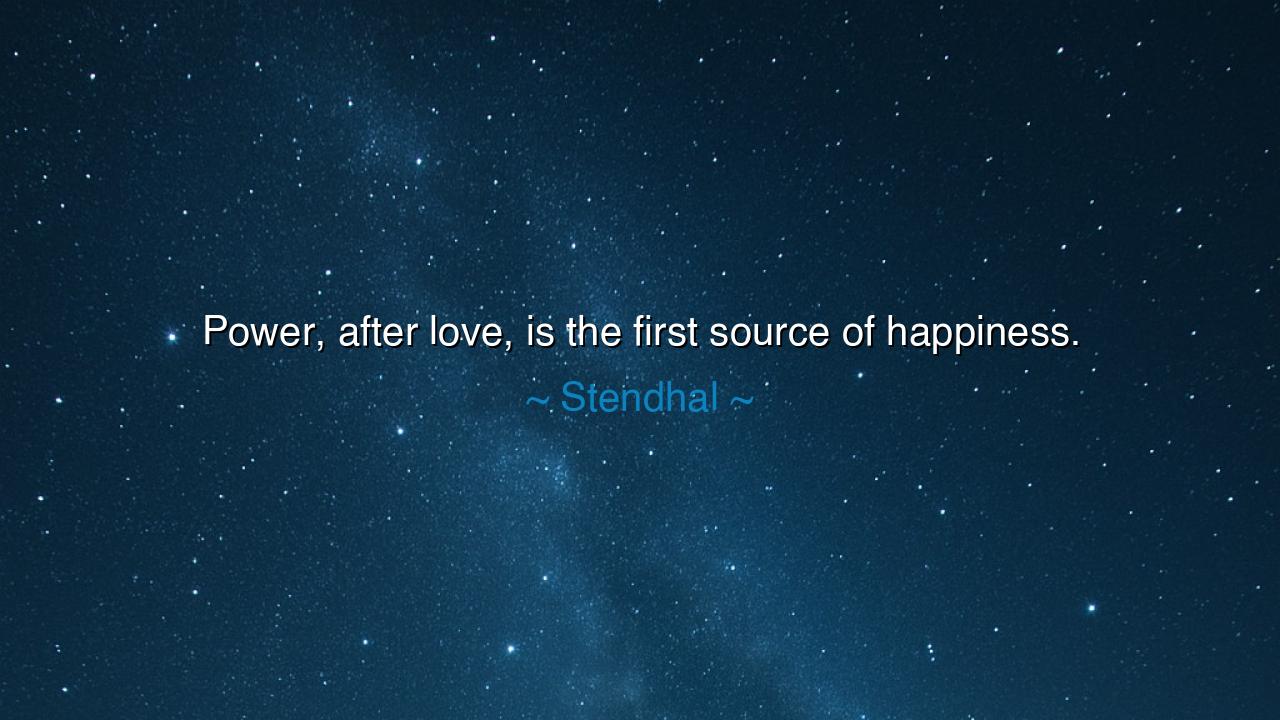
Power, after love, is the first source of happiness.






“Power, after love, is the first source of happiness.” — Thus spoke Stendhal, the great French novelist and keen observer of the human heart. In these few words, he pierces to the core of what moves mankind. For in the ancient order of the soul, love is the first and purest light, the fountain of connection, purpose, and joy. Yet close behind it stands another force — power, the fire that gives strength, direction, and agency to that love. Together, they form the twin pillars of human fulfillment: the heart that feels deeply, and the will that acts boldly. Without one, life is empty sentiment; without the other, it is blind ambition.
Stendhal, born Marie-Henri Beyle in the early nineteenth century, was a child of the Napoleonic age — an era when Europe trembled beneath the march of armies and the clash of empires. He lived through a time when men and women saw the heights and depths of human will: love blazing in the midst of war, and ambition rising from the ruins of nations. From this world of passion and power he drew his insight: that the desire for power, rightly understood, is not a lust for domination, but a longing for mastery — mastery over oneself, over circumstance, and over fate. It is the second source of happiness because it enables the first. For what use is love without the power to protect it, to express it, to make it flourish in the world?
The ancients, too, knew this truth well. In the dialogues of Plato, we are told that the soul has three parts: reason, spirit, and desire. Spirit — that inner flame of courage and drive — is what gives man the strength to pursue the good and defend what he loves. This is the essence of power as Stendhal meant it: not tyranny, not pride, but the inner command that makes one the author of one’s own life. To be powerless is to be a leaf blown by the winds of chance; to be powerful is to be the tree that stands firm even as the storm howls around it.
Consider the life of Joan of Arc, a peasant girl who rose from obscurity to lead armies and challenge kings. Her power did not come from wealth or station, but from conviction — the fusion of faith and will. She loved her country, her God, and her people, and that love became fire within her, giving her courage beyond mortal measure. When she said, “I am not afraid, for God is with me,” she embodied Stendhal’s truth: that love gives meaning to power, and power gives strength to love. Even when betrayed and condemned, her spirit did not yield, for the happiness she knew was born not from safety, but from purpose.
Yet there is danger in this truth. For power without love becomes corruption — the cold tyranny of ego. History is filled with those who sought happiness in control alone, only to be consumed by emptiness. The emperor who conquers the world but cannot command his heart remains a slave to his hunger. Stendhal understood this tension deeply. He saw that love softens power and makes it human, while power gives love the courage to act. Happiness, therefore, is found in their union: the gentleness of compassion guided by the strength of will.
The modern soul, weary of both weakness and excess, can learn much from this balance. To reject power is to live timidly, afraid to shape one’s destiny; to worship power is to lose one’s soul in vanity. The wise man does neither. He cultivates power as a servant of love — as the instrument of his higher calling. This power is not measured in dominance, but in self-mastery: the ability to command one’s emotions, persevere through difficulty, and act with integrity. True happiness comes when one feels capable of directing one’s life toward what is good and just, rather than being dragged helplessly by circumstance or fear.
The lesson, then, is clear: seek both love and power, but let love come first. Love is the heart’s compass; power is the arm that wields it. Without love, power is hollow; without power, love is helpless. To live fully, cultivate both — love for what is worthy, and the strength to bring it into being. In your work, in your relationships, in your dreams, do not wait for the world to grant you permission. Build within yourself the courage to act and the tenderness to care.
So remember, my child: happiness is not found in comfort or chance. It is born in the union of love that feels and power that creates. When you find what you love — a person, a cause, a craft — give it the full force of your will. Let your love guide your strength, and let your strength protect your love. Then, as Stendhal knew, you will have touched the secret of the human spirit — that the truest joy comes not from being served by life, but from standing tall within it, powerful in purpose, and radiant in love.






AAdministratorAdministrator
Welcome, honored guests. Please leave a comment, we will respond soon